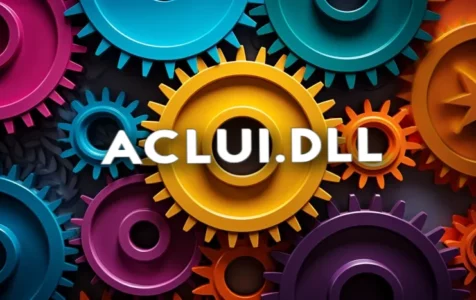The file aclui.dll stands for Access Control List User Interface, and it’s a pivotal component within the Windows operating system. Created by Microsoft Corporation, this file is also recognized as the Security Descriptor Editor. It plays a fundamental role in managing security descriptors, vital for defining access controls and permissions on different objects within the system, such as files and registry keys.
The aclui.dll file is commonly located in the C:\Windows\System32 directory. On versions such as Windows 10/11/7, its size usually ranges around 125,440 bytes or smaller, depending on the operating system version. Essentially, it’s a part of dynamic link libraries (DLLs), designed to be used by multiple programs at the same time, promoting efficiency and memory conservation.
Is Aclui.dll Safe to Run? Could It Be a Virus or Malware?
Given its origins from the trustworthy Microsoft Corporation, aclui.dll should inherently be a safe file. However, this does not mean it’s impervious to being mimicked or exploited by malicious software. It’s crucial that the file is in its correct location (System32 folder) and that its digital signature is verified, ensuring it’s not a sneaky piece of malware in disguise.
The integrity of aclui.dll can be confirmed through the Task Manager by examining the ‘Verified Signer’ status. If the status is labeled as “Unable to verify”, this might raise suspicions about the legitimacy of the file.
Expert Tip: For smoother PC performance, consider using a PC optimization tool. It handles junk files, incorrect settings, and harmful apps. Make sure it's right for your system, and always check the EULA and Privacy Policy.
Special offer. About Outbyte, uninstall instructions, EULA, Privacy Policy.
Common Issues with Aclui.dll and Solutions
Users may encounter various issues related to aclui.dll such as “aclui.dll not found,” “aclui.dll missing,” or “aclui.dll error loading.” These problems can be a nuisance, causing applications to malfunction or the system to become unstable.
There are several ways to fix issues with aclui.dll:
1. Restore the file from the Recycle Bin if it’s been accidentally deleted.
2. Install any available Windows updates, as updates might contain fixes or the latest version of the DLL file.
3. If a virus infection is suspected, scanning the computer with antivirus software is beneficial.
4. System File Checker (SFC) scan can be run to replace a missing or corrupted copy of the DLL file.
– Open Command Prompt as an Administrator.
– Type “sfc /scannow” and hit Enter.
5. If the SFC couldn’t solve the issue, deploying the DISM (Deployment Image Service and Management Tool) might help.
– Run Command Prompt as an Administrator.
– Type “DISM /Online /Cleanup-Image /RestoreHealth” and press Enter.
Additional Remedies and User Experiences
Users who do not feel comfortable with the technical steps can perform a system restore, taking their computer back to a point where aclui.dll was intact. For detailed community discussions on aclui.dll issues, users can visit the following thread: Microsoft Community Discussion.
Preventing Future Inconveniences
To avert future issues with aclui.dll and to maintain a stable system, regularly scheduled backups are important. Enabling Windows Update to automatically install security patches and avoiding suspicious downloads that might carry disguised malware are also key strategies to protect one’s system. Installing and using robust security software can likewise provide essential layers of defense against various types of malicious software that might target DLL files.
Conclusion
Aclui.dll is a legitimate and critical Windows system file that should not be removed or modified unless you know precisely what you are doing. Irregularities concerning this file are commonplace but generally, with the help of the step-by-step solutions provided herein or by seeking help from various online forums, they can be rectified without much hassle. It is essential to ensure that your system is regularly updated and scanned to keep such DLL-related issues at bay.
